In today’s rapidly evolving digital world, businesses constantly search for advanced marketing tactics to stay ahead of the competition. Many brands depend on AI in marketing to develop effective strategies and campaigns. Regardless, the question is, is AI marketing your friend or foe? Is it worth investing in? Does it offer advantages to businesses or pose a threat? As we explore AI in marketing, we see its benefits and challenges.
AI marketing is a powerful instrument. AI can analyze data quickly and personalize customer experiences better than ever. However, as AI changes how businesses connect with their customers, there are also worries about privacy, job loss, and ethical issues. While human judgment will always be crucial, AI offers new opportunities for those who can effectively utilize its capabilities.
If you are a brand owner concerned about using AI for marketing, you can reach out to us at BrandLoom. Being the best AI digital marketing agency in India, we can help your business leverage AI technology to take marketing to the next level.
Let’s find out more about the benefits and challenges of implementing AI in marketing:
What is Artificial Intelligence, and How Does It Benefit Businesses?
Artificial Intelligence (AI) is the simulation of human intelligence in machines, intended to carry out functions like learning, thinking, and problem-solving. AI brings a lot of benefits to businesses, such as better decision-making, better data analysis, and task automation.
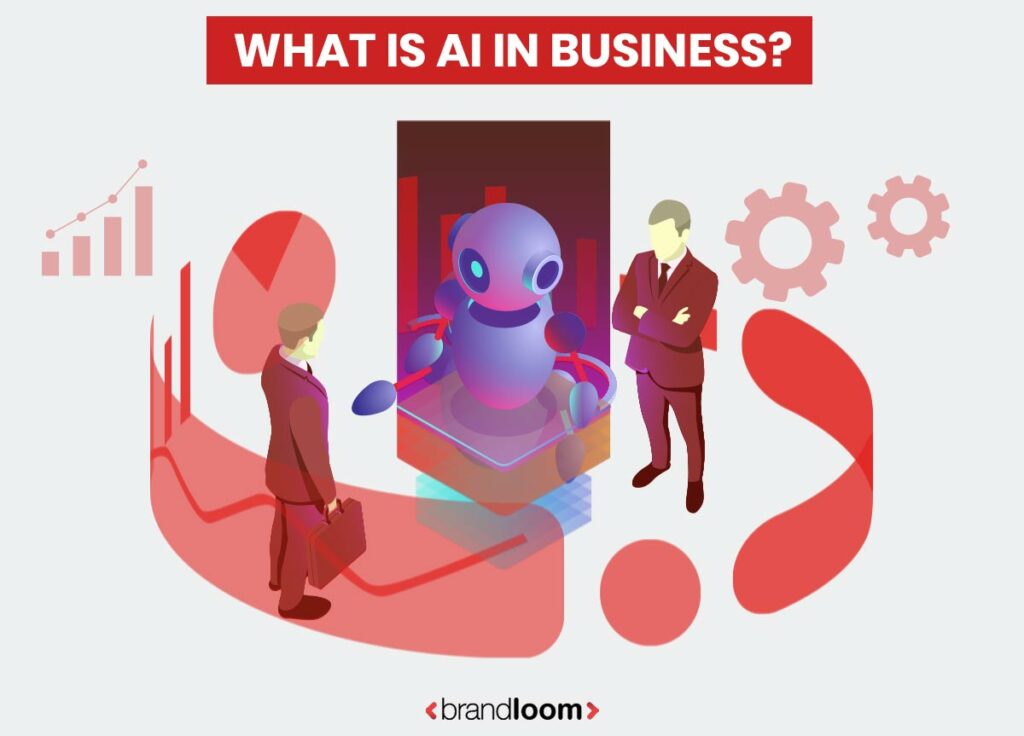
Businesses can use AI in marketing to increase productivity, cut expenses associated with running their operations, and obtain insightful data that brings innovation and business expansion.
A lot of companies struggle with AI’s implementation, wondering if it will be worth enough. The fear of data privacy issues, high costs, and implementation issues are common challenges they face. Yet, with the right expertise, these challenges can be navigated. If you are looking to deploy AI in Digital Marketing, then partnering with a tech-savvy AI digital marketing agency in India, such as BrandLoom, can help your brand leverage the best AI marketing tools & tactics and grow as a brand.
AI: Beneficial or Distructive? Key Concerns for Marketers
AI helps professionals complete tasks faster, freeing up enough time for other work. Marketers may find AI-generated content performs better. They use AI in various ways: for writing content, drafting content, creating ideas and inspiration, creating outlines, etc.
However, most people don’t fully trust AI for task completion. Instead, they use AI to make the process easier by helping with writing, drafting, generating ideas, and creating outlines. For instance, when writing a piece of content, marketers are concerned about AI’s inability to understand emotions and the robotic writing style, making it hard to trust a machine to produce a complete piece of content.
Marketers using AI also have concerns regarding job displacement due to automation, data security breaches, and a lack of knowledge about effectively using AI to increase productivity. As this is a new area, some marketers find it challenging or threatening. This helps us understand why most marketers prefer to work themselves rather than depend too much on AI.
Use of AI in Marketing
Artificial Intelligence analyzes enormous volumes of data and converts it into information, automated activities, and actionable insights by using machine learning and large-language models (LLM). AI can also engage with customers based on specific behaviors on your website, such as clicking a button or liking a social media post.
This means that AI allows you to automate marketing processes, evaluate customer behavior, and produce customized marketing content. New AI tools are constantly being developed and released, promising to help marketers work faster, smarter, and more efficiently.
Businesses can use such tools to enhance various aspects of their marketing strategies, from social media post creation to email marketing and content development.
Here are some examples of how businesses are using AI to meet their online marketing objectives along with some AI tools for digital marketing:
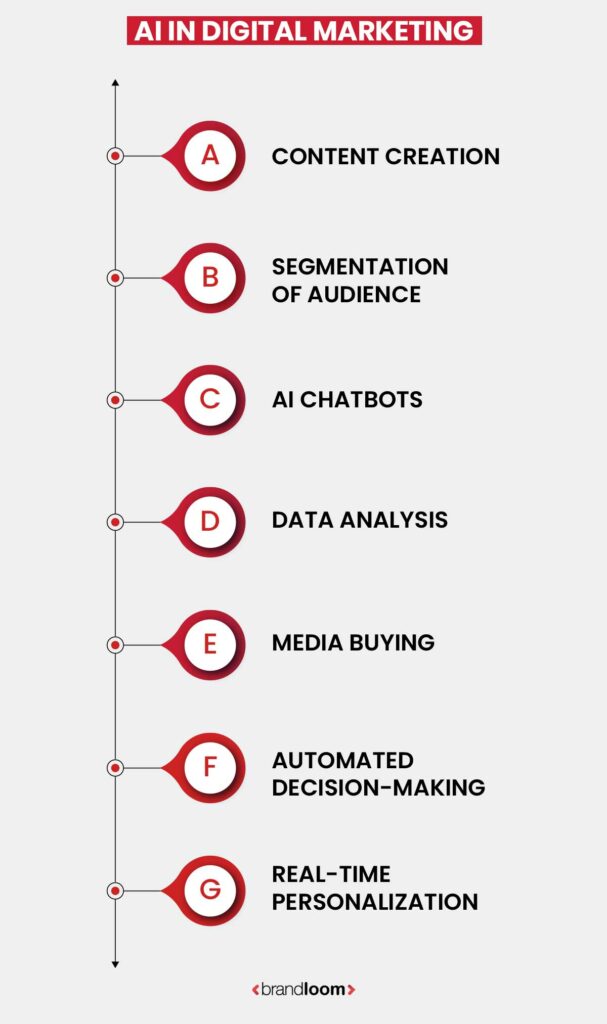
1. Content Creation AI tools for marketing
Several new applications for artificial intelligence have emerged since the introduction of OpenAI’s generative AI platform ChatGPT. Such AI platforms can help marketing teams save time and money by producing a wide range of content, including copies, marketing messages, emails, subject lines, video subtitles, website content, and more.
2. Segmentation of Audience: AI tools for marketing
AI helps companies divide their customers and target audiences into groups according to characteristics, interests, and actions in an effective way. This leads to enhanced targeting and more effective marketing campaigns, resulting in stronger customer engagement and improved ROI.
3. AI Chatbots: AI tools for marketing
Marketers are increasingly using AI chatbots to improve customer engagement. After receiving enough training, these bots can communicate with customers throughout their journey, resolve tickets quickly, and increase customer satisfaction.
4. Data Analysis: AI tools for marketing
Gathering and analyzing vast amounts of marketing data from various campaigns would take a lot of time when done manually. However, with the help of artificial intelligence, marketers can save time and find insightful patterns that guide their next moves. Businesses may make better judgments more quickly by automating data analysis.
5. Media Buying: AI tools for marketing
AI is able to forecast which ads and media slots will best reach a company’s target market and provide the best return on investment. Choosing the most effective platforms and timing for advertising is part of this. Businesses can maximize returns on investment by making sure their marketing funds are used more wisely through the optimization of media buying.
6. Automated Decision-Making: AI tools for marketing
AI marketing solutions help companies select the most effective growth or marketing plans by analyzing historical data and outside sources. This automated decision-making procedure facilitates quick market adaptation. Companies may maintain a competitive edge by putting strategies supported by insights derived from data into practice.
7. Real-time Personalization: AI tools for marketing
AI uses historical user preferences to customize a user’s interaction with marketing assets such as emails, social media posts, and web pages. This customization promotes activities like opening links, registering, or making purchases. Businesses may increase customer engagement and boost conversion rates by providing timely and relevant material to individual customers through real-time customization.
AI Technologies that Enable Marketing
With the help of strong platforms that use cutting-edge AI technology to deliver crucial information, marketing is made possible by AI in remarkable ways. While natural language processing (NLP) optimizes social content and boosts customer engagement, techniques like aspect-based sentiment analysis, named entity identification, and semantic classification give specialized insights and enhance customer experience.
Here are a few insights on such technologies:
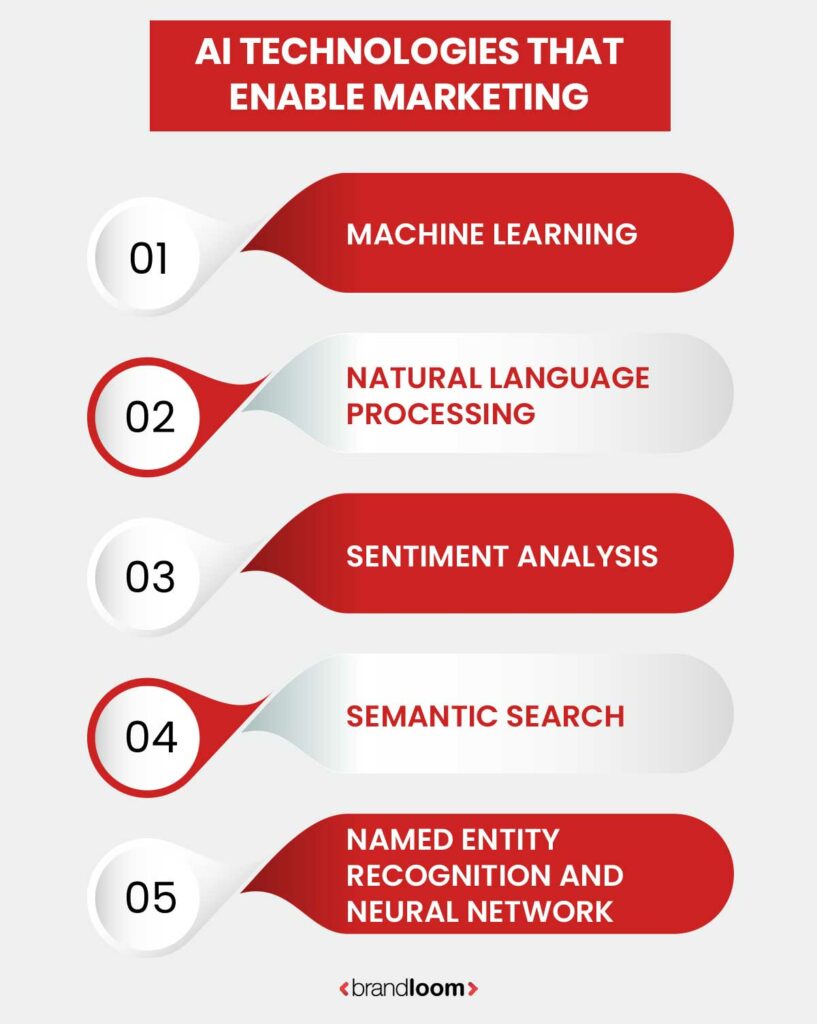
1. Machine Learning (ML)
Machine Learning (ML) employs statistical techniques to provide accurate insights into audience sentiment, customer experience, and other important marketing factors. With fast results, trained machine learning models automatically carry out tasks including text mining, topic extraction, aspect categorization, and semantic clustering. These models are perfect for scaling corporate operations and reducing future IT investment since they get better over time as they process more data.
2. Natural Language Processing (NLP)
NLP enables AI marketing solutions to comprehend social listening data in a contextual and semantic manner. Through the use of lexical and statistical techniques, natural language processing (NLP) is able to extract crucial information from a wide range of posts, messages, reviews, and comment regardless of their spelling mistakes, emojis, code shifts, colloquialisms, and abbreviations. These capabilities are further improved by natural language generation (NLG), which aids in the creation of high-performing content for posts and customer responses. This increases audience outreach and improves contact with current customers.
3. Sentiment Analysis
Sentiment analysis involves assessing customer emotions from various feedback sources, and this plays a crucial role in reputation management. Using advanced algorithms, sentiment analysis evaluates social listening data, including survey responses, online reviews, and messages. Each piece of feedback is assigned a sentiment score, ranging from -1 (negative) to +1 (positive), with neutral comments scored as zero.
When examining social data, sentiment analysis models take into account the sentiment score of each business aspect mentioned by customers. These individual scores are then combined to estimate the overall sentiment of the brand, reflecting the customer’s experience. This complete sentiment overview helps businesses understand their performance and identify areas for improvement.
4. Semantic Search
NLP relies heavily on semantic search algorithms since they understand the meaning behind words and phrases instead of just using keywords. By removing duplicates and classifying relevant terms into semantic clusters, these algorithms provide a precise assessment of the customer experience or brand performance. Comprehending the competitive landscape and keeping an eye on industry standards can help you fine-tune your marketing and sales tactics to meet your long-term objectives.
5. Named Entity Recognition (NER) and Neural Networks
NER allows AI systems to recognize important entities like CEOs, celebrities, places, and companies, even if they are misspelled in big datasets. NER is crucial for generating knowledge graphs by establishing relationships between entities to derive context and insights. Neural networks, which mimic human brain functions, retain and connect these data points, enhancing ML models through deep learning. This results in precise insights about market trends, influencer suitability, and competitive analysis.
Key Considerations for Implementing AI in Marketing
When utilizing AI in marketing campaigns and operations, it’s critical to start with a comprehensive plan in order to reduce challenges and immediately optimize the return on AI investments. Before using any AI marketing solutions, digital marketers should take into account the following important factors:
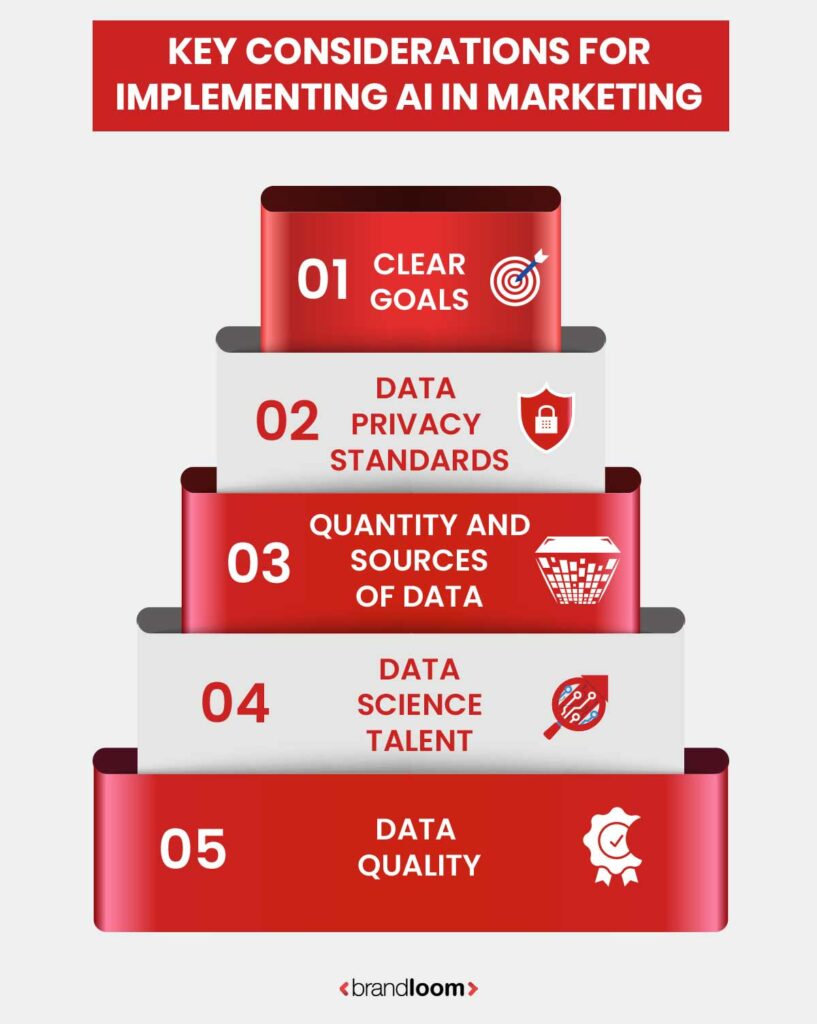
1. Clear Goals
From the very beginning, establish clear objectives and marketing metrics for your AI marketing program. Identify areas for improvement within campaigns or operations, such as segmentation, and establish clear KPIs to measure the success of AI-augmented marketing campaigns.
2. Data Privacy Standards
Ensure that your AI marketing platform adheres to appropriate data use standards for data personalization. Establish and program data privacy standards into your AI marketing platforms to preserve compliance and customer trust.
3. Quantity and Sources of Data
AI marketing requires a huge volume of data. This data comes from past marketing efforts, your company’s CRM, and website data. It can be used to teach the AI to learn customer preferences and external trends.
4. Data Science Talent
Many marketing team members are lacking in the AI and data science knowledge they need to work with vast amount of data. Collaborating with third-party organizations can help with data collection and analysis, train AI technologies for best results, and receive continuous support.
5. Data Quality
The data that artificial intelligence uses has to be consistent and error-free for it to make wise conclusions. Work together with data management teams to develop procedures for data cleansing and maintenance. For that, consider the seven essential data dimensions: timeliness, completeness, consistency, accuracy, validity, uniqueness, and integrity.
Best Practices for Implementing AI in Marketing
By leveraging AI, companies can efficiently handle vast amounts of data, create personalized customer experiences, and optimize their marketing efforts for better ROI. The strategies listed below can help in implementing AI in marketing and achieving the desired results:
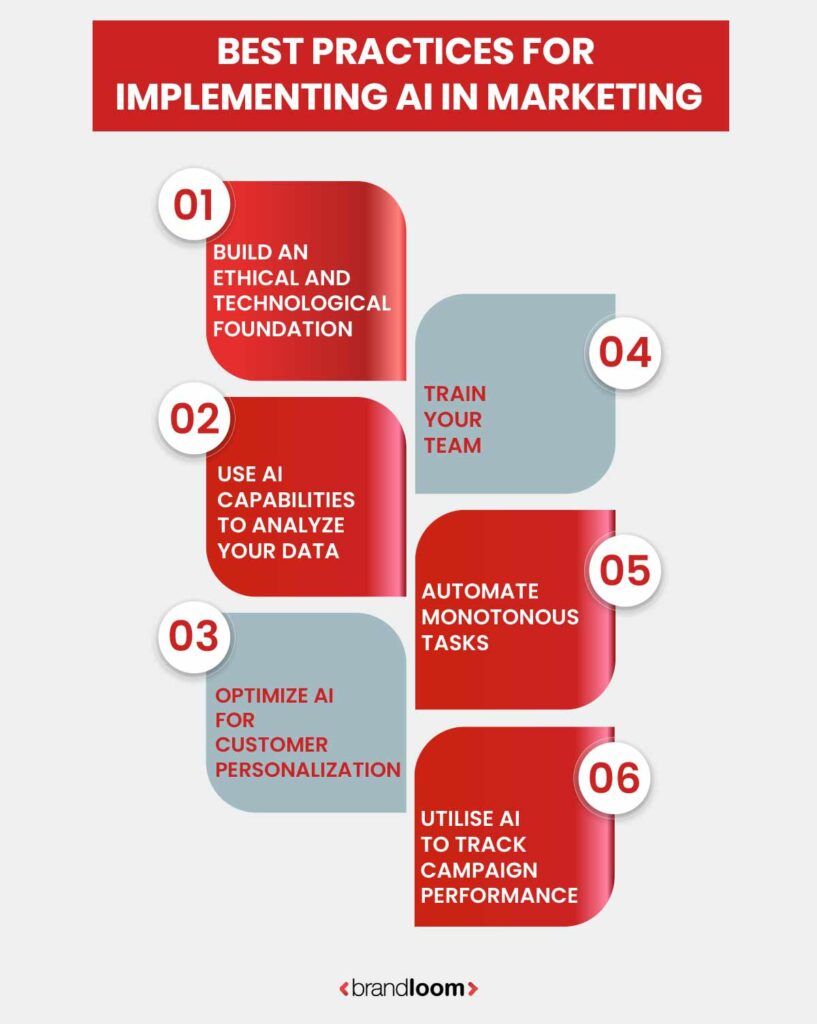
1. Build an Ethical and Technological Foundation
Adopt transparent data policies, make sure privacy laws are followed, and encourage the moral application of AI. For example, communicate extensive data usage regulations and set up explicit opt-in/opt-out methods.
2. Use AI Capabilities to Analyze Your Data
Utilize AI-powered solutions to integrate data and obtain insights into client preferences. Marketing tactics can be made successful with a comprehensive understanding of customer behavior.
3. Optimize AI for Customer Personalization
By using AI-driven recommendation engines on e-commerce platforms, you can greatly improve the consumer experience by offering product recommendations based on individual tastes and past purchases.
4. Train Your Team
Teach your staff how to create engaging content with AI-driven tools for natural language creation. Create individualized social media posts, product descriptions, and email campaigns that appeal to your target market.
5. Automate Monotonous Tasks
Utilize AI-powered automation technologies to handle repetitive tasks like data input, report creation, and email scheduling. This helps your team concentrate on developing innovative campaigns and strategic initiatives.
6. Utilise AI to Track Campaign Performance
Utilize analytics solutions driven by AI to obtain up-to-date information on consumer interaction and conversion rates. Optimize campaign performance and return on investment by making data-driven decisions and adjustments.
Challenges of Implementing AI Marketing
Understanding client wants and preferences and responding quickly and efficiently to them are key components of modern marketing. AI marketing solutions are becoming increasingly popular because of their ability to data-driven, real-time marketing decisions. AI marketing tools have great potential, but they are still developing, therefore marketers need to be careful when utilizing AI marketing tools.
Here are the major challenges of utilizing AI in marketing:
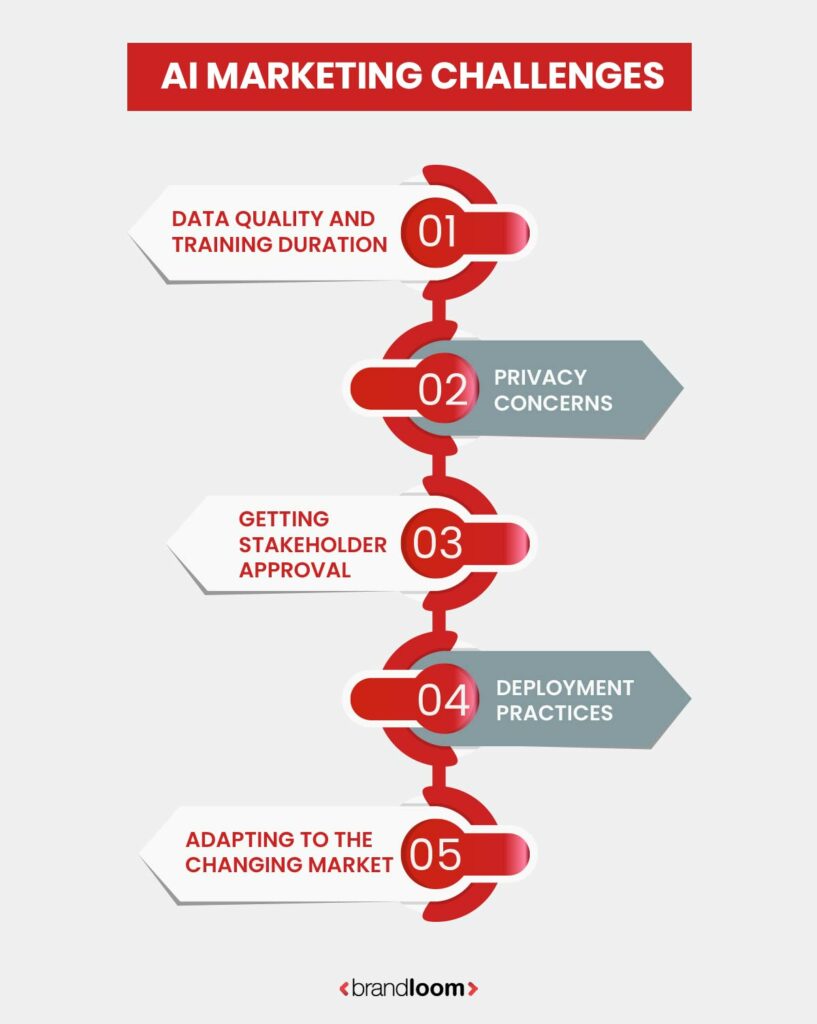
1. Data Quality and Training Duration
In order to effectively utilize AI marketing technologies, users must undergo in-depth training on company objectives, consumer preferences, historical trends, and general context. Accurate, timely, and representative high-quality data are required for this training procedure. If the data is inadequate, the AI will make inaccurate decisions, badly affecting marketing efforts.
2. Privacy Concerns
Strict laws are required to be followed when using customer data for AI marketing. Breaking any laws regarding the privacies of users can result in heavy penalties and damage to the reputation of a brand. Marketers need to make sure AI technologies are configured in a way that complies with ethical standards and privacy regulations. Companies need to be open and honest about their use of client data in order to keep customers’ trust and stay out of trouble
3. Getting Stakeholder Approval
It might be difficult to convince stakeholders of the benefits of investing in AI marketing. While progress in efficiency and return on investment in AI marketing can be measured, enhancements to the customer experience or brand image are more difficult to estimate. Strong attribution tools are necessary for digital marketing teams to bring out the advantages of AI. Gaining stakeholder support also requires communicating AI’s ability to deliver strategic results.
4. Deployment Practices
Since most AI marketing solutions are still in their development stage, there is a lack of established practices to guide initial deployments. Marketers need to think about AI integration’s long-term effects as well as its immediate advantages. For long-term success, a strategic approach that incorporates ongoing learning and adaptation is essential. Collaborative efforts across various departments can also help in creating an effective AI strategy.
5. Adapting to the Changing Market
AI marketing is transforming the marketing environment, which may result in the displacement of some roles and the creation of new ones. So, marketers need to be proactive and acquire new abilities to keep up with these developments.
Advantages of Using AI in Digital Marketing
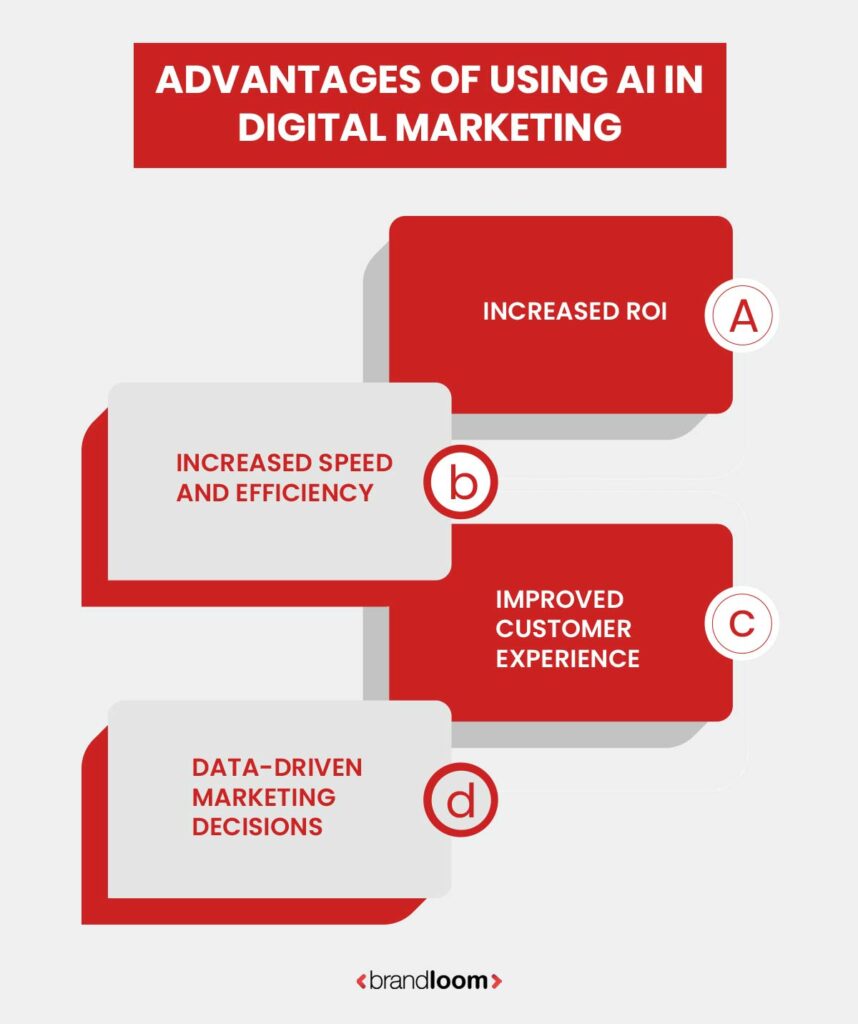
1. Increased ROI
AI helps marketing teams develop effective marketing materials in real time by leveraging data analytics and insights. This approach saves money and resources by reducing staff time and production costs.
2. Increased Speed and Efficiency
With the help of AI, marketers may save more time on developing each piece of content or marketing strategies, giving them more time to dedicate to important activities.
3. Improved Customer Experience
By providing personalized recommendations, AI improves customer relationships and increases the possibility of repeat purchases.
4. Data-Driven Marketing Decisions
AI helps a business grow by leveraging data to evaluate, forecast, and produce marketing assets. This data-centric approach ensures that marketing decisions are based on solid insights.
Disadvantages of Using AI in Digital Marketing
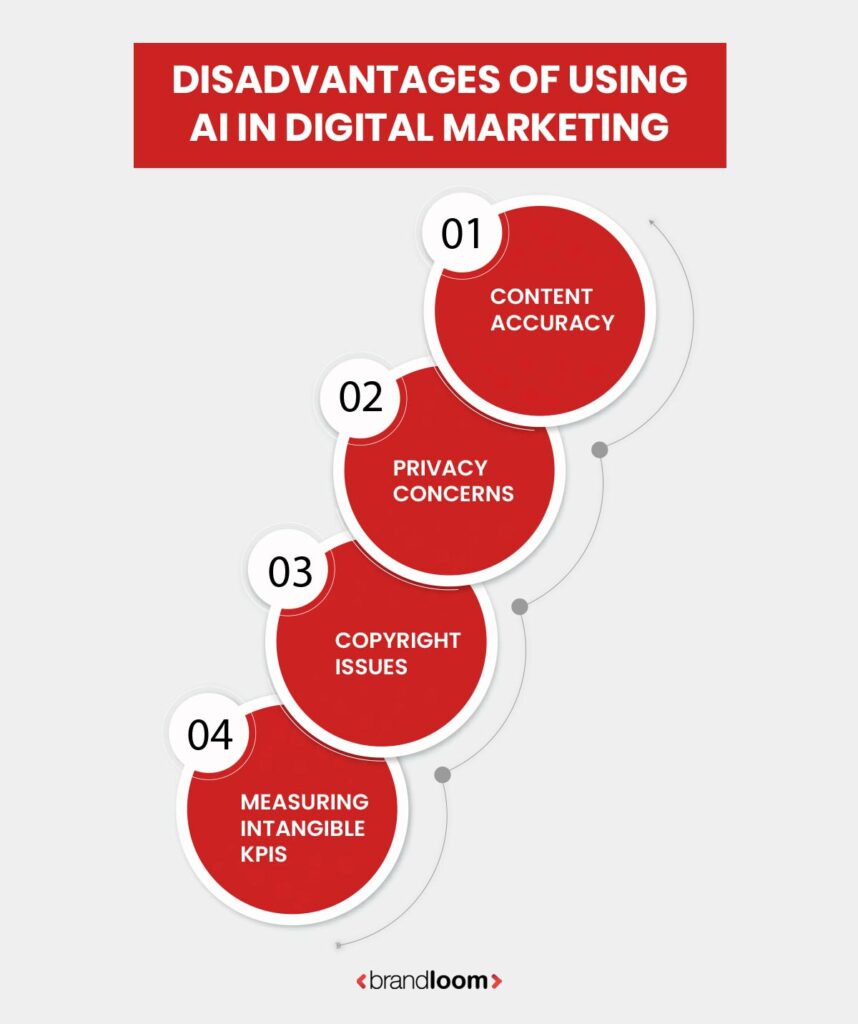
1. Content Accuracy
Without human interaction and editing, AI can produce content with mistakes, biases, or off-brand tones. Factual errors are common in AI-generated content.
2. Privacy Concerns
AI generally relies on cookies and past online usage to anticipate purchases. Ensuring compliance with privacy rules is vital when utilizing AI in marketing to prevent legal complications.
3. Copyright Issues
The AI legal landscape is still evolving. AI systems trained on public content run the danger of producing content that is too similar to that of competitors.
4. Measuring Intangible KPIs
Analysis of AI marketing efforts can be challenging sometimes due to intangible KPIs. While some metrics are easily measurable, others like customer experience improvement, brand awareness, and reputation enhancement are harder to measure.
Some of the Best AI Tools for Digital Marketing
Here are some of the best AI Tools for Digital Marketing:
- HubSpot’s AI-Powered CRM
- Application: Automates lead scoring, customer segmentation, and personalized email campaigns, enhancing customer relationship management.
- Jasper (formerly Jarvis)
- Application: AI-driven content creation tool that helps generate blog posts, social media content, ad copy, and more with natural language processing.
- Grammarly
- Application: Enhances content by providing AI-powered grammar, spelling, and style suggestions, ensuring high-quality, error-free copy.
- Google Analytics with AI Insights
- Application: Uses machine learning to provide actionable insights, trends, and predictions about website traffic and user behavior.
- Canva with Magic Resize
- Application: AI features to quickly resize and adapt designs for different platforms, ensuring consistent visual branding across channels.
- Phrasee
- Application: AI tool that generates and optimizes email subject lines, social media ads, and push notifications for better engagement.
- Adext AI
- Application: Automates and optimizes digital ad campaigns by targeting the most relevant audiences and adjusting bids in real time.
- Hootsuite with AI Analytics
- Application: Manages social media marketing by scheduling posts and analyzing engagement metrics with AI-driven insights.
- ChatGPT
- Application: AI chatbot that assists with customer service, content generation, and real-time engagement on websites and social media.
- Acquisio
- Application: Optimizes PPC campaigns using machine learning to adjust bids, allocate budgets, and improve ad performance.
Some of the Free AI Digital Marketing Tools
Here are some of the free AI Digital marketing tools for you to consider:
- Copy.ai
- Application: Generates creative content, such as blog intros, social media captions, and ad copy, using AI with a free version available.
- Crello (Now VistaCreate)
- Application: An AI-powered graphic design tool similar to Canva, offering free templates and design features for creating marketing visuals.
- Headlime (Free Trial)
- Application: AI tool that crafts high-converting copy for landing pages, ads, and emails, with a limited free trial.
- SparkToro
- Application: Free AI tool for audience intelligence, helping marketers discover where their target audience hangs out online.
- Pixlr
- Application: Free AI-driven photo editing tool that offers advanced editing features similar to Photoshop but with AI enhancements for quick edits.
- Piktochart
- Application: Free AI-powered infographic and presentation creator that simplifies the design process, making data visualization easy.
- Trello with Butler
- Application: Trello’s AI-powered automation tool, Butler, helps streamline project management and task automation with a free tier available.
- Moz Link Explorer (Free Access)
- Application: Provides a free, limited version of its AI-powered backlink analysis tool, helping improve SEO strategies.
- Remove.bg
- Application: A free AI tool for automatically removing backgrounds from images, perfect for creating clean visuals quickly.
- Portent’s Content Idea Generator
- Application: A free AI tool that generates creative content ideas and titles to kickstart your content marketing efforts.
Conclusion
Artificial intelligence has taken the digital media industry to the next level. The potential of AI technology to create content, segment audiences, and analyze performance will only grow as it develops, offering organizations even more benefits. Partnering with a leading digital marketing agency in India like Brandloom may help you properly utilize AI by ensuring that your methods are not only cutting-edge but also tailored to your brand’s specific objectives.
Frequently Asked Questions
AI is revolutionizing business by utilizing the power of data. By analyzing vast amounts of customer data, AI can identify hidden patterns and predict future behavior. This allows marketers to focus on the right audience, delivering the right message at the right time. AI tools available today help businesses in their marketing efforts through strategies like content creation, task scheduling, email marketing and so on. As one of India’s leading advertising agencies, BrandLoom specializes in crafting innovative advertising strategies to connect with your target audience and make a lasting impact
Additionally, AI automates repetitive tasks like campaign management. It can ensure maximum reach by continuously analyzing campaign results and making real-time adjustments. Marketers may improve advertisement campaigns and maximize return on investment by using its predictive capabilities. AI also helps to determine what content will resonate with the audiences. It serves as a powerful marketing tool that enables companies to engage with clients more deeply.
AI can assist business development associates including digital marketers achieve their goals by providing a variety of tools and insights. BrandLoom, recognized as one of India’s top advertising agencies, is dedicated to developing impactful advertising strategies that effectively engage and resonate with your target audience.
The following are a few applications of AI in digital marketing:
Personalization
AI is capable of analyzing large volumes of data to provide users with personalized content and experiences. Artificial intelligence can personalize information and use targeted marketing to reach each user based on their behavior and interests. This will boost user engagement and conversion rates.
Chatbots
AI-powered chatbots offer immediate assistance and interaction with customers. They are able to manage transactions, lead the audience through the sales funnel, and respond to questions.
Analytics
By utilizing past data, AI can predict future patterns and consumer behavior. This enables marketers to understand the changes in the industry, modify their plans, and make data-driven decisions that result in more successful campaigns.
Ad targeting
AI can improve advertisement targeting by evaluating user data and determining the most relevant audience group. Digital markets can maximize ROI by using this approach, ensuring that the correct audience sees their ads at the right moment.
AI can be used in marketing for a variety of tasks like content creation, automation, social media listening, audience segmentation, audience personalization, data analysis, reputation management, and so on.
AI algorithms provide deep customer understanding through sentiment analysis and enable strategic actions. Intelligent AI tools identify keywords to help create compelling posts, respond effectively to customer comments, and develop impactful product descriptions.
AI tools can continuously monitor and analyze the performance of marketing campaigns in real time. Through clever workflows, AI-driven smart automation increases the operational effectiveness of customer support teams and social media managers. They provide insights into what’s working and what’s not, helping marketers to make quick adjustments and improve outcomes.
AI Digital marketing agencies in India can use their experience to analyze AI-driven findings and provide support to promote brand expansion.
Netflix and Spotify can be taken as prime examples of using AI in marketing. They tend to revolutionize marketing through personalization and user engagement.
Netflix employs AI algorithms to evaluate user viewing patterns, search terms, and rating systems to offer user-tailored content recommendations. This customized strategy enhances overall viewing duration and keeps viewers engaged by anticipating what they are likely to watch next. It increases user experience and retention while also improving user satisfaction.
Spotify uses AI to create customized playlists based on user behavior, song preferences, and listening habits. Examples of these playlists are Discover Weekly and Daily Mix. AI-powered suggestions let users connect more deeply with the platform by introducing them to new music that suits their likes. This personalization increases user engagement, loyalty, and time spent on the app.
At BrandLoom, one of India’s leading advertising agencies, we specialize in crafting customized advertising strategies that ensure your message reaches the right audience effectively.
AI in marketing is expected to improve efficiency, personalization, and data-driven insights in the future. AI will increase engagement and return on investment by automating repetitive operations, improving ad targeting, and creating customized customer experiences. Integration of AI technology will transform marketing tactics, driving innovation and expansion.
Dependence on generative AI is expected to increase in the coming years. Marketers are currently utilizing it or experimenting with it. There is a chance that 75% of people will use this technology shortly.
Marketing teams will use AI to provide value and ROI, better allocate budgets, and deliver essential KPIs, increasing productivity and innovation. As the best advertising agency in India, BrandLoom is at the forefront of creating innovative marketing strategies that resonate in the ever-evolving landscape of future advertising.

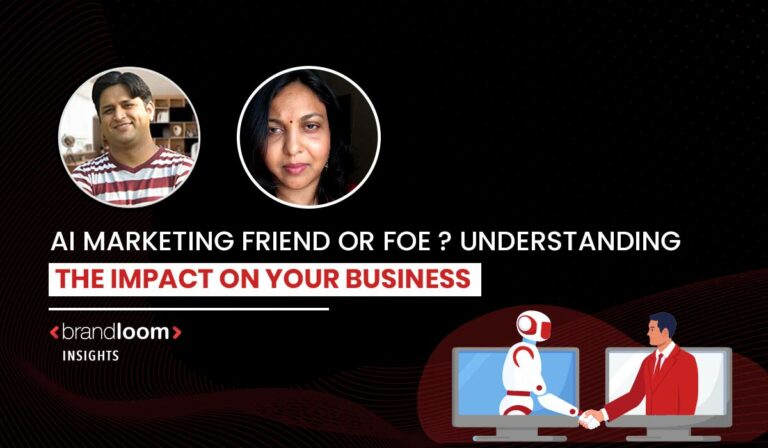


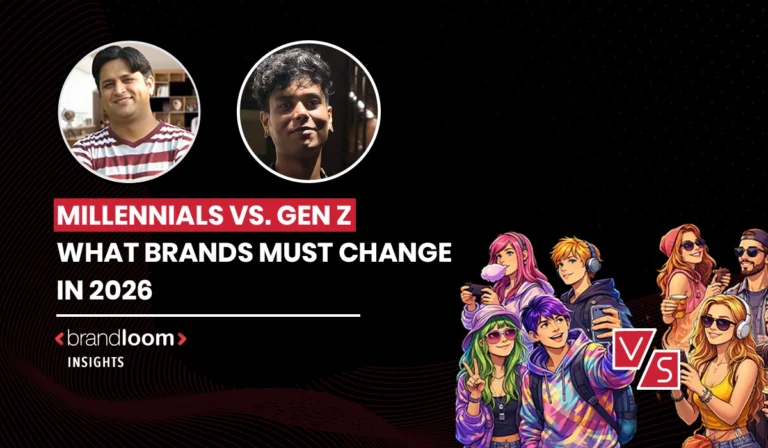
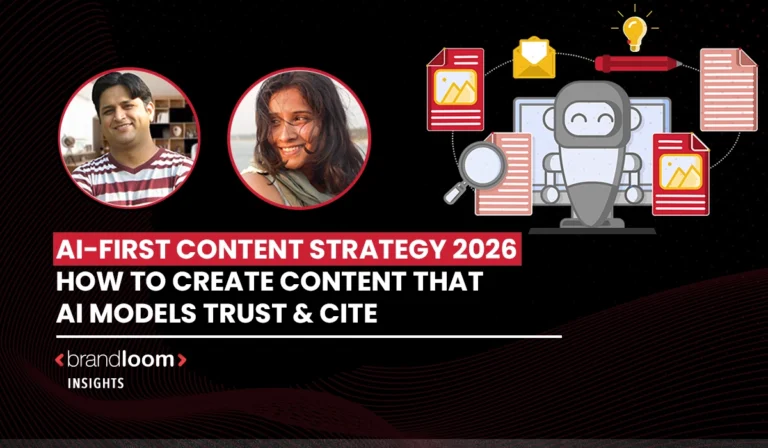
Thanks for Sharing.!
AI marketing is a double-edged sword. It offers powerful tools to boost efficiency and data-driven decisions, but it also raises concerns about privacy and job security. Striking the right balance is key.